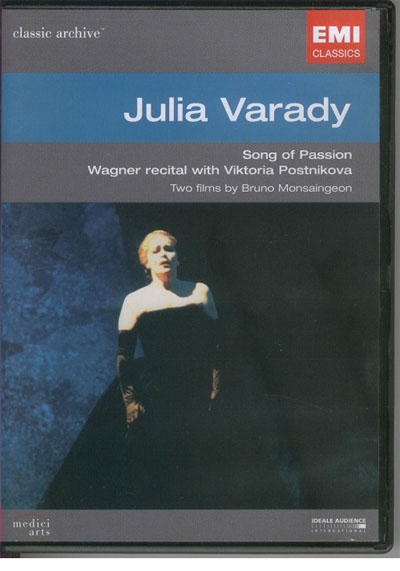
JULIA VARADY DVD
Classic Archive EMI
DVB 3884589

At first sight a fine documentary that succeeds very well in avoiding the two main questions in Madame Varady’s career. How much did she profit from becoming the fourth Mrs. Fischer-Dieskau (his first wife died young, his second was a movie star far more popular than the baritone, his third one an alcoholic) ? and even more important: how much did her career suffer from being married to the baritone ? In both cases the answer is probably: immense. Being married to Dieskau for 30 years was as is understandable a big career boost for the young Hungarian soprano (officially a Rumanian as that robber country had succeeded in conquering quite a piece of Hungary after the first world war). But Mr. Dieskau freely admitted in some of his many worthwhile memoirs that he could be very conceited and often aloof. And then it was Julia Varady who acted, protected the gentleman from fans and public and press and took the flack. When she had to appear in Antwerp and Ghent somebody near her told me that every half hour a call from Germany came through with all kinds of wishy-washy problems so that the soprano finally decided she was “indisposed” and took the first flight to Berlin to hold the gentleman’s hand and soothe his nerves. So I wonder how much truth there is in the lady’s declaration in the documentary that she is not one for travelling around the world but prefers to stay as much as possible as home. On the other hand it is well possible that this abstaining from incessant jet hopping may be one of the reasons her vocal health was still wonderful after 35 years of singing. Most people couldn’t believe their ears when her Orfeo recital records appeared in the nineties. Here was a 53year old soprano who sounded in her Puccini-recital as if she was half her age, as if she was in the first bloom of youth instead of having a career of 32 years behind her. That was also the moment a lot of them understood that the best soprano in the world had been hiding from them for many years. A few years later she made known her decision to stop appearing on the scene. She is very outspoken on this DVD as to the reasons why. There is the age (56 at the time the documentary was produced; nowadays she is 66) but above all there is the Regie-Theatre. She had had her fill of directorial crooks who think of themselves as more important than composers, singers and musicians and whose permanent masturbation was encouraged by politico-correct cowardly managers. The documentary is well illustrated with brief (too brief) snatches of some of her performances and if there is one regret it is that EMI didn’t take the pains to launch a full DVD with at least her big moments in an astounding area of operatic music. But those snatches prove that she was the shining example of a formidable spinto being at ease in French, Italian, German and Russian roles and maybe this was her undoing a bit as she never specialized.
Apart from the documentary there is a fine recital of Wesendonck-lieder recorded in 1997 and she proves that a good operatic voice is necessary for them. But still one would have preferred to have heard and seen her in some of her best operatic roles.